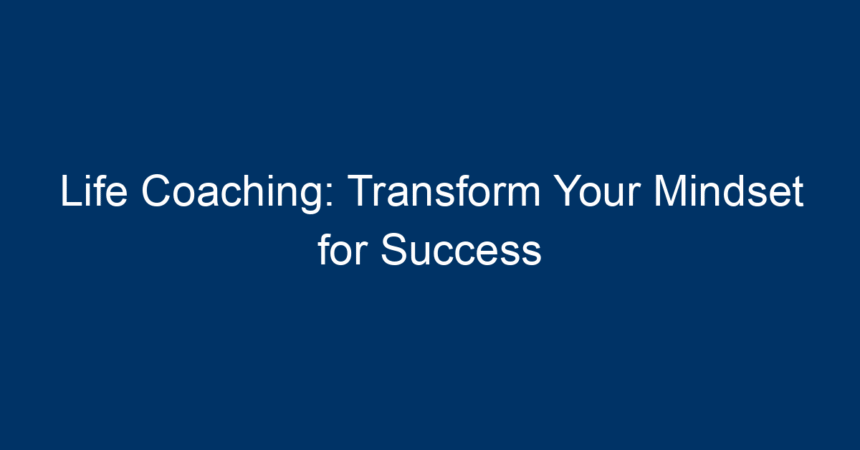In today’s fast-paced world, many people seek clarity, purpose, and direction. Life coaching offers a powerful pathway to achieving these aspirations, guiding individuals to rethink their beliefs, unleash their potential, and ultimately transform their lives. Whether you are aiming for personal growth, professional development, or a shift in mindset, life coaching could be the key to unlocking your success.
What is Life Coaching?
Life coaching is a collaborative process wherein a trained coach helps clients identify their goals, clarify their values, and develop actionable strategies. Unlike therapy, which often focuses on healing past traumas, life coaching is forward-looking, emphasizing growth and achievement. Coaches utilize various techniques, including motivational interviewing, mindfulness strategies, and goal-setting exercises, creating a customized framework for each client.
The Importance of Mindset in Life Coaching
Understanding Mindset
A mindset consists of the beliefs and attitudes shaped by our experiences, which guide our reactions and decisions. Psychologists often differentiate between a “growth mindset” and a “fixed mindset.” A growth mindset embraces challenges and views failures as opportunities for learning, while a fixed mindset sees difficulties as obstacles and may lead to a fear of taking risks.
The Role of Mindset in Personal Development
In life coaching, mindset is crucial. Transforming your mindset can lead to improved resilience, enhanced problem-solving skills, and increased motivation. Coaches help clients recognize limiting beliefs that may hinder progress, enabling them to replace these with empowering thoughts.
How Life Coaching Can Transform Your Mindset
1. Identifying Limiting Beliefs
Life coaching often begins with identifying limiting beliefs—thoughts that constrain our potential. For example, a client may believe they’re not good enough to pursue a promotion at work. A skilled life coach will challenge these beliefs, helping clients recognize their inherent worth and capabilities.
2. Setting SMART Goals
Once limiting beliefs are acknowledged, coaches guide clients in setting SMART goals (Specific, Measurable, Achievable, Relevant, Time-bound). This structured approach clarifies the path forward, offering clients a roadmap to success. A well-defined goal fuels motivation and encourages accountability, essential components in mindset transformation.
3. Developing Emotional Intelligence
Emotional intelligence—the ability to understand and manage one’s emotions and empathize with others—is a key focus in life coaching. Coaches teach skills for recognizing emotional triggers, responding effectively to stress, and enhancing interpersonal relationships. This mastery fosters a positive mindset, enabling individuals to navigate personal and professional challenges adeptly.
4. Building Resilience
Resilience refers to the capacity to bounce back from setbacks. Life coaching empowers clients to develop this vital trait by reframing challenges as opportunities for growth. Through techniques such as cognitive restructuring and mindfulness, clients learn to embrace challenges with a positive attitude, reinforcing a growth mindset.
5. Establishing Accountability
Accountability is a crucial aspect of life coaching, as it encourages clients to take ownership of their actions. Regular check-ins with a coach help maintain momentum and provide a support system. This structure not only drives clients towards their goals but also fosters a mindset of discipline and commitment.
Key Techniques Used in Life Coaching
1. Visualization Techniques
Visualization is a powerful tool that enhances motivation and focus. Coaches often guide clients through visualization exercises where they imagine achieving their goals, helping solidify their commitment to success. This technique can effectively transform mindset and reinforce positive beliefs.
2. Positive Affirmations
Affirmations are positive statements that challenge negative thoughts. Regularly using affirmations can help shift a client’s self-perception and encourage a new mindset. For instance, saying “I am capable and worthy of success” can help replace self-doubt with confidence.
3. Mindfulness Practices
Mindfulness practices, such as meditation and deep breathing, are often incorporated into life coaching. These techniques help clients stay grounded, manage stress, and enhance self-awareness. By regularly practicing mindfulness, individuals can cultivate a more resilient and positive mindset.
Real-Life Success Stories: Transformations Through Life Coaching
Case Study 1: From Overwhelmed to Empowered
Emily, a marketing professional, often felt overwhelmed and stuck in her career. After starting life coaching, she identified her limiting beliefs and began setting achievable goals. Through consistent accountability and emotional intelligence strategies, she not only secured a promotion but also felt more empowered and fulfilled in her work.
Case Study 2: Turning Dreams into Reality
Jake had always dreamed of starting his own business but lacked the courage to take the leap. Working with a life coach, he was able to break down his goals into manageable steps, confronting his fears head-on. By embracing a growth mindset, Jake launched his business within six months and saw immediate growth.
Choosing the Right Life Coach
1. Qualifications and Experience
When selecting a life coach, it’s essential to consider their qualifications. Look for certifications from recognized coaching organizations and experience in the specific area you wish to develop.
2. Coaching Style
Every coach has a unique style. Some may take a more structured approach, while others may focus on emotional support. It’s beneficial to have an initial consultation to determine if the coach’s style aligns with your preferences.
3. Client Testimonials
Reviews and testimonials can provide insight into a coach’s effectiveness. Reach out to previous clients if possible or check online platforms for feedback.
Conclusion: Making the Leap Towards Transformation
Life coaching can be a transformative journey, equipping you with the tools and mindset needed for success. By identifying limiting beliefs, setting actionable goals, and embracing new perspectives, you can reshape your future. Remember, the first step towards change is often the hardest, but with the right guidance, you can achieve lasting transformation.
Actionable Insights
- Reflect on Your Limiting Beliefs: Take some time to identify thoughts that may be holding you back. Write them down and challenge each one.
- Set SMART Goals: Choose one area of your life you want to improve and create a SMART goal around it.
- Practice Daily Affirmations: Start each day with an affirmation that reinforces your strengths and capabilities.
- Explore Mindfulness: Incorporate mindfulness techniques into your daily routine to enhance resilience and self-awareness.
Embrace the journey of life coaching, and watch as your mindset transforms, paving the way for success in every area of your life!




